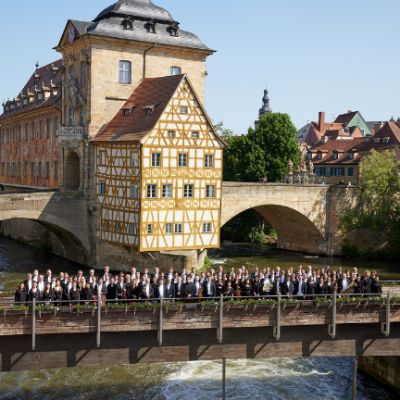| Wolf, Hugo (1860-1903) | Scherzo and Finale | |
| Mahler, Gustav (1860-1911) | Chants d'un compagnon errant (Lieder eines fahrenden Gesellen) | |
| Rott, Hans (1858-1884) | Symphony no. 1 in E major |
| Bamberger Symphoniker | |
| Jakub Hrůša | Direction |
| Michael Nagy | Baryton |
The Bamberg Symphony Orchestra is known for its grand Bruckner and Mahler tradition – but we also enjoy looking at these composers’ wider context, the music scene in late Romantic Vienna, which was a hotbed of talent. Our concert starts with a work by Hugo Wolf, whose short life (he died at only 43) walked a thin line between genius and madness. Today he is known as a major composer of lieder, and his instrumental oeuvre remains an insider tip. 16-year-old Wolf spent a brief time at the Vienna Conservatory in 1876/77 before continuing his musical education under his own steam. During this time, he tinkered with a symphony, but lost the first two movements at a train station, and so of his ambitious symphonic plans, only a charming Scherzo and the elaborate Finale survive. Mahler, who was the same age as Wolf, was among Wolf's circle of friends in Vienna, and the two even shared an apartment while they were students. Michael Nagy will interpret a similarly early work of genius by Mahler: in 1885, at the age of 23, he completed the wonderful »Lieder eines fahrenden Gesellen« (»Songs of a Wayfarer«), setting his own poems. Mahler was inspired by his unrequited love for a soprano – and thus the cycle’s restless wandering through nature is determined by the contrast between sadness and joy. The concert will end with an exciting work by Hans Rott, who died at the age of only 25 – in a mental hospital, like Hugo Wolf. Rott was Bruckner’s favourite pupil and a fellow student of Wolf and Mahler, who said of him, »He is so akin to my own intrinsic self that he and I seem like two fruits from the same tree.« Rott's Symphony in E Major, completed in 1880, long remained forgotten in the archives. It displays a superb talent for orchestration, emotional power and a wealth of surprises – and the influence of both Bruckner and Mahler is clearly to be heard.


